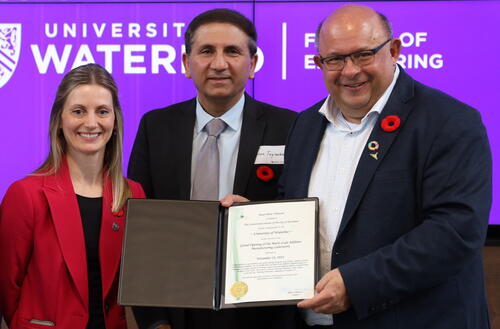From humble beginnings as a small room tucked away on campus, the University of Waterloo’s Multi-Scale Additive Manufacturing (MSAM) Lab opened its doors today to a new facility that will serve as a home for the university’s next-generation metal 3D-printing research.
Launched in 2017, Waterloo’s MSAM Lab has become the largest metal additive manufacturing (AM) academic facility in Canada and is one of the most comprehensive facilities of its kind in the world.
The new facility’s home will be located in Kitchener, Ont.’s Catalyst137 facility and contain more than $25 million worth of state-of-the-art equipment like a quad-laser powder bed fusion machine. Being housed within the Catalyst137 facility will also help sprout collaboration with other tenants inside the world’s largest dedicated Internet-of-Things (IoT) manufacturing space.
Since its inception, the lab’s focus has centred on developing intellectual property and training students in an innovative R&D environment with a mandate to pioneer advanced scientific discoveries. MSAM’s focus on additive manufacturing provides a more efficient and sustainable way to prototype and manufacture a range of products across a myriad of sectors that include aerospace, healthcare, and automotive.
“The MSAM Lab’s expanded facilities will allow for increased R&D capacity, which will enable us to meet growing demands in additive manufacturing for advanced scientific discovery, elevated collaboration with industry and a vital training ground for the next generation of engineering innovators,” said Dr. David Clausi, associate dean for research and external partnerships at the University of Waterloo’s Faculty of Engineering.
Funding for the MSAM Lab was provided by industry and government partners including the Federal Economic Development Agency for Southern Ontario (FedDev), which provided $8.2 million in financing in 2021 to establish the Additive Manufacturing Alliance (AMA). Since its founding at the University of Waterloo in 2020, the AMA has supported 119 companies through R&D collaborations, prototyping and testing services, and training. Additionally, 39 products and services have been commercialized through this project to date.
“The expanded facility will continue to help businesses accelerate and grow while giving them a place to test their products,” said the Honourable Filomena Tassi, Minister responsible for the Federal Economic Development Agency for southern Ontario. ”Our manufacturing sector and innovators are embracing next-generation technologies for a better future and stronger Canada and our government will continue to support them.”
Dr. Ehsan Toyserkani, founder of the MSAM Lab as well as a mechanical and mechatronics engineering professor at the University of Waterloo, said that the new MSAM Lab facility will help students and faculty research create much-needed disruptions in metal additive manufacturing for the greater good of society.
“Our primary objective is to connect our lab’s solutions to reliable partners to help influence high-impact product and process improvements within industry,” he said.
Subscribe to AM Chronicle Newsletter to stay connected: https://bit.ly/3fBZ1mP
Follow us on LinkedIn: https://bit.ly/3IjhrFq
Visit for more interesting content on additive manufacturing: https://amchronicle.com


